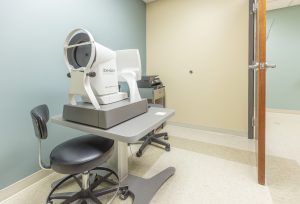 Please call 502-259-6277 to schedule your free initial consultation.
Please call 502-259-6277 to schedule your free initial consultation.Diseases and Conditions
UofL Physicians LASIK surgeons perform refractive surgery to correct nearsightedness (myopia), farsightedness (hyperopia), and astigmatism.
- Nearsightedness (myopia) – Close objects appear clear, but objects that are farther away appear blurry; occurs if the eyeball is too long or the cornea has too much curvature
- Farsightedness (hyperopia) – Distant objects appear clear, but close objects do not come into clear focus; occurs if the eyeball is too short or the cornea has too little curvature
- Astigmatism – Blurred vision created from the prevention of light properly focusing on the retina; occurs from an irregularly shaped cornea or the irregular curvature of the lens inside the eye
Common symptoms treated by LASIK
- Need to squint
- Blurry vision
- Fatigue or headaches caused by eye strain
- Aching or burning eyes
- Blurry vision when looking at distant objects (myopia)
- Difficulty seeing while driving at night (night myopia)
- Difficulty in concentrating and maintaining clear focus on close objects (hyperopia)
- Irritability or nervousness after sustained concentration (hyperopia)
The FDA and American Academy of Ophthalmology have developed guidelines for good LASIK candidates:
- At least 18 years of age (21 in some cases), because vision tends to change more frequently in people younger than 18.
- You should not have this procedure if you are pregnant or breast-feeding, because these conditions can affect eye measurements.
- You should not have this procedure if you take certain prescription drugs, such as Accutane, Cardarone, Imitrex, or oral prednisone.
- You should have healthy eyes with a stable prescription.
- You should be in good general health. LASIK may not be recommended for patients with diabetes, rheumatoid arthritis, lupus, glaucoma, herpes infections of the eye, or cataracts.
- You should be in general good health and discuss any other health concerns with your LASIK surgeon before undergoing the procedure. LASIK may not be recommended for patients with diabetes, rheumatoid arthritis, lupus, glaucoma, herpes infections of the eye, or cataracts.
If you are not a good candidate for LASIK, you may be eligible for photorefractive keratectomy (PRK). Learn more about PRK on the Treatments and Services tab.
Treatments and Services
LASIK consultation
UofL Physicians LASIK surgeons focus on precision in their consultations to plan the intricate work that will be performed for the procedure. You and your UofL Physicians surgeon will have to opportunity to discuss whether LASIK is right for your vision condition. Your initial consultation visit is free. Please call 502-259-6277 to schedule.
How is the LASIK procedure performed?
The procedure consists of reshaping the cornea by first creating a flap, which is lifted, prior to delivering the laser treatment to the underlying cornea. The LASIK surgeons at UofL Physicians are trained to accurately calculate the dimensions of the flap on the cornea to be lifted and the correct amount of tissue that should be removed to reshape the eye for better vision by having you focus your eyes on a target. Once the laser has reshaped the cornea, the flap is laid back in place. The procedure takes 10-15 minutes per eye.
Photorefractive keratectomy (PRK)
If you are not a good candidate for LASIK, you may be able to receive PRK (photorefractive keratectomy), in which a flap is not created. In this procedure, the outermost layer of the cornea (the epithelium) is removed and the treatment is delivered to the underlying tissue. A bandage contact lens is placed over the eye after the treatment for the first week after surgery to allow the epithelium to regrow and heal. The visual outcomes from this procedure are the same as LASIK.
What can I expect after LASIK?
We will provide specialized eye gear for you to wear after the procedure.
Our surgeons require the patient to come in for a post-operative checkup the day after the procedure. LASIK is intended to have an immediate effect with improved vision the day after the procedure and continuing stabilization for the next few days. At your post-operative appointment, your surgeon will provide you with a time frame of recovery, including when you will be able to return to work/school or safely drive a vehicle. At UofL Physicians your safe recovery is of the utmost importance and our physicians will treat you with the care you need. In addition, you will have the opportunity to have any questions answered by our surgeon.




